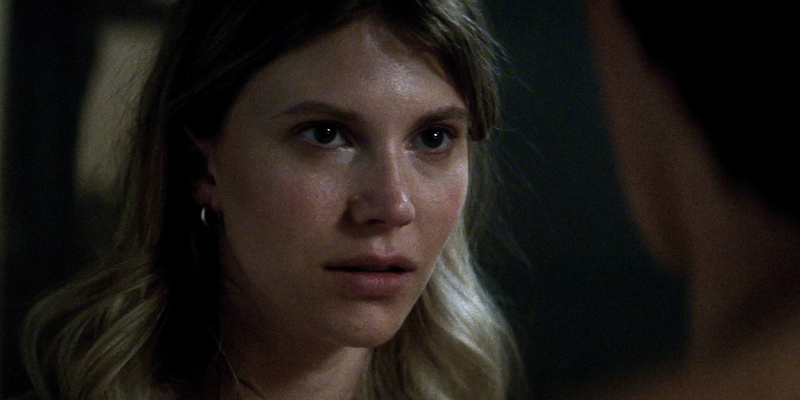
Review by
Eric Hillis
Directed by: Kjersti Helen Raasmussen
Starring: Eili Harboe, Herman Tømmeraas, Dennis Storhøi, Gine Therese Grønner

For as long as I can remember I've had a recurring nightmare in which
I'm attempting to flee from someone or something but find myself unable
to move my legs, as though they're embedded in cement. It's absolutely
terrifying but at least when I wake up the experience is over. Spare a
thought for those who suffer from sleep paralysis, a condition in which
your body goes to sleep while your mind stays awake, leading to dreams
and nightmares that blur the lines between the subconscious and the
conscious.
Norwegian writer/director Kjersti Helen Rasmussen opens her
feature debut Nightmare with some text explaining the
phenomenon of sleep paralysis. Later on the film reminds us that the
word "nightmare" is derived from Nordic folklore. A creature from the
spirit world known as a "mare" sits atop its sleeping victim and if said
victim is female, impregnates them as a means of entering our physical
world. With this newfound knowledge in mind, I don't think I'll ever
refer to a bad footballer as "having a mare" again.

The nightmares begin for Mona (Eili Harboe) when she moves into
a spacious apartment with her outwardly timid yet controlling dick of a
boyfriend Robby (Herman Tømmeraas). The couple got a great deal
on the place because a previous tenant committed suicide while pregnant,
which has wrought havoc with its property value. Almost immediately Mona
begins having lucid dreams. Initially they're pleasant, with a sexed up
Robby seducing her and leading to orgasms in the physical realm that the
real life Robby probably hasn't been able to replicate.
Of course, things take a dark turn as the dream Robby grows ever more
sinister. Mona begins to have out of body experiences, forced to watch
as she's raped by dream Robby, which leads to her becoming pregnant.
Aware of her apartment's dark history, and the suspicious disappearance
of the infant belonging to the constantly rowing couple across the hall,
Mona fears the worst.

If you watch enough horror movies, you start to see the same themes and
tropes repeated over and over again. What keeps the horror fan invested
is that talented filmmakers can take an old theme or trope and inject
new life into it. The emergence of so many women filmmakers in the genre
over the past decade has refreshed horror by adding new perspectives,
but we're already starting to see the female perspective on certain
themes and tropes repeat themselves. Nightmare is a mish
mash of classic horror themes and tropes: the pregnant woman in peril;
the inattentive male partner more concerned with closing that deal at
work than in listening to his lover's concerns; the demon that
terrorises our heroine through dreams etc. Had
Nightmare arrived as recently as five years ago,
Rasmussen's female take on such things would have felt like a breath of
fresh air, but she's now competing with other women filmmakers exploring
the same ideas.
No accusations of plagiarism can be levelled as both movies arrived
within months of each other, but Nightmare is uncannily
similar in its narrative to Michelle Garza Cervera's Mexican horror
Huesera: The Bone Woman. Both movies feature a young woman who has no interest in having a
child find herself pregnant and subsequently terrorised by a demon from
her culture's folklore; both movies' protagonists have given up their
creative ambitions to appease their male partners; and the two films
even share the same shocking ending. Cervera's film is far more focussed
than Rasmussen's however, with the latter messily cobbling together a
few different horror sub-genres. The backdrop of Catholicism adds an
extra layer to Cervera's genre examination of life in a patriarchal
society that doesn't translate so well to the more progressive setting
of Norway in this case.

Ultimately it's the lack of scares that prevent
Nightmare from living up to its name. There's too much
exposition, too much time spent explaining backstories and not enough
spent on constructing tense set-pieces.
Harboe is very good in the role of a woman manipulated by men in both
her waking and dream state, and along with her outstanding turn in
Joachim Trier's
Thelma, it's surely only a matter of time before she follows the likes of
Rebecca Ferguson and Noomi Rapace in making a transition from
Scandinavia to Hollywood. But the movie asks too much of her to fill in
gaps and her character is written so inconsistently that she becomes
frustrating. At one point Mona comes across tangible evidence that her
neighbours have probably murdered their infant, yet inexplicably keeps
the knowledge to herself. From that point any sympathy we had for Mona
is largely eradicated.


